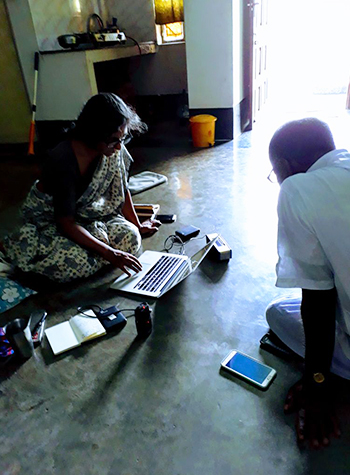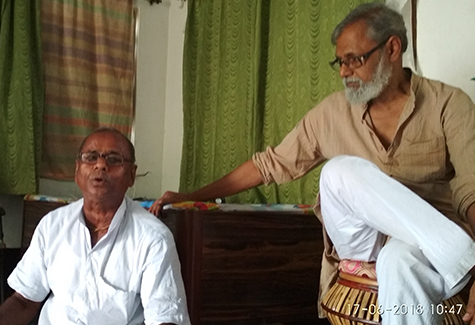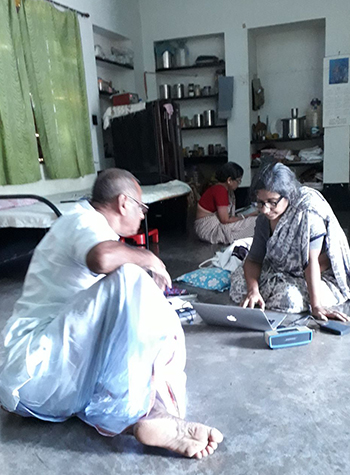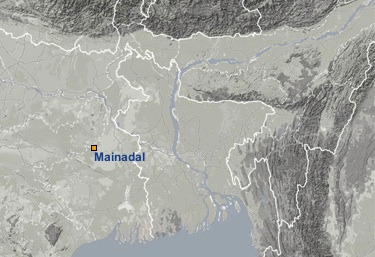Lesson from Nirmalda, Bolpur, 17 June 2018
This is a ‘lesson’ I had with Nirmalda, Nirmalendu Mitra Thakur, at the home of his cousin, Milan Mitra Thakur, both of the Mitra Thakur family of Mainadal, in Birbhum, who were recorded by Arnold Bake in 1933. The song I am drawn to is one we first heard during their Janmashtami and Nandotsav festival celebrating the birth of Krishna, in 2014, when we were in Mainadal. That was our first trip to the village, on the trail of sounds left to us by Bake. Nandotsav is an elaborate two-day festival of singing and dancing and rituals; this song about the birth of Krishna to Jashoda, the queen, in the home of Nanda, the cowherd king, was among the many songs we heard that day and I don’t think I took any particular notice of it at the time of the singing, Only when I heard it later on our recordings from that day that I began to play this section again and again. Then I called Nirmalda and asked for the words and their meaning. Before this day in 2018, therefore, I had been following this song and making room for it in my own cycle/circle of songs for several years.

Nirmalendu Mitra Thakur and Moushumi in the home of Milan Mitra Thakur in Bolpur, Birbhum, going through kirtan recordings of Arnold Bake and related recordings of The Travelling Archive.
17 June 2018 was a day heavy with rain, our first monsoon clouds of Asarh having just arrived. So, we can hear the rain throughout this recording. Milanda and his wife lived in a unique room at the time. Milanda is a painter and you could feel it in the way everything was in the long single room on the first floor, circumscribed by a balcony, with parallel walls lined with windows. That room was everything for them–bedroom and kitchen and studio and living room; bare floor, bare walls, minimum furniture, a single bed, Milanda’s canvases and brush and paint stood in one corner, the kitchen things in another–everything neatly arranged. In this recording, while we are singing and talking, tea is being made and we can hear Milanda and Kona Boudi (his wife) talking too. They are concerned about my health, and advise me not to drink too much tea because it disturbs my sleep. I laugh and say I need to have tea all the time.

Milan Mitra Thakur, sitting on a mora, Nirmalendu MItra Thakur on the floor. The curtains are drawn as it is raining outside.
নিদে অচেতন রানী, কিছুই না জানে/চেতন পাইয়া পুত্র দেখিলা নয়ানে (বয়ানে)। The queen lies unconscious in sleep. Awakened she sees her son’s face. ব্রজরাজ বলি, রানী/ রানী, ডাকি ধীরে ধীরে/শুনিয়া আইলা নন্দ সূতিকা মন্দিরে। ‘Borojoraj’, (King of Braj), the queen whispers. Hearing her call, Nanda comes to the birth-chamber. হরল চেতন দেখি আপন তনয়/লাখি পূর্ণিমা চান্দ জিনিয়া উদয়। He sees his son and is lost for words; as if a million full moons have struck. যে যায় দেখিতে, পুনঃ না আসিতে পারে/যদুনাথ দাস ভাসে আনন্দ সাগরে। Who goes to see [this birth/the child], they cannot return. Jadunath sails in the ocean of joy.
This telling of the story is very interesting, for it seems here as if Jashoda* is in labour and she is birthing Krishna. The myth however is that Jashoda is Krishna’s foster mother; Nanda his foster father. Krishna, who is not human at all but god born as a human child, must be saved from a political conspiracy, or he will be killed at birth. He has come to save the world, so he must be saved; separated from his birth parents Devaki and Basudev, and found a safe home. That is how Krishna is ‘born’ in Nanda’s home.
The festival of the Mitra Thakurs of Mainadal with their five century-old legacy of Krishna and Chaitanya devotion, has the dual name of Janmashtami and Nandotsav, thus celebrating both the birth of Krishna, the god, his arrival on earth, as well as his arrival in the house of Nanda and into the arms of Jashoda. The festival is grand in scale and meaning. it is also familial and intimate. Thus they sing the tenderness of the love between the parent and the child. Nirmalendu Mitra Thakur fondly remembers his Sejda, the famous Nabagopal Mitra Thakur, who was recorded by Arnold Bake 1933, and then again by Deben Bhattacharya in 1954, and who had taught him this song.

Nirmalendu Mitra Thakur and Moushumi listen to old recordings. Kona sits in her little corner
On this day in 2018, we sang this together, while talking about many other things, including reminiscing about visits of other scholars to Mainadal, talking about old photographs and worrying over the future of Mainadal. The Mitra Thakur tradition of kirtan singing is essentially patriarchal, their girls do not sing in the family temple or at their festivals. Hence there is some irony in Nirmalda teaching me, a woman, their song, and even telling me that I must let them know if ever I sing this song on the radio, so that they can listen.
Written by Moushumi on Janmashtami 1427 BS (12 August 2020)
*Note that the name Jashoda would be written as Yashoda in most parts of India, but in Bangla we pronounce our ‘ya’ as ‘ja’, and our effort in The Travelling Archive is to stay close to the sound of the language, where possible, although we cannot always do this with consistency. Working across languages, I am often–mostly unsuccessfully–grappling with the question of how to write sound with signs.
- Saptiguri, North Bengal. 27 November 2003. Nirmala Roy
- Bolpur, Birbhum. 25 November 2003. Nimai Chand Baul
- Kolkata. 4 September 2019. Purnadas on Nabani Das Baul
- Surma News Office, Quaker Street, East London. 27 February 2007. Ahmed Moyez
- Ambikapur, Faridpur, Bangladesh. 29 April 2006. Hajera Bibi
- Sylhet, Bangladesh. 22 April 2006. Chandrabati Roy Barman and Sushoma Das
- Sylhet, Bangladesh. 21 April 2006. Arkum Shah Mazar
- Sylhet, Bangladesh. 20-21 April 2006. Ruhi Thakur and others
- Jahajpur, Purulia. 27 February 2006. Naren Hansda and others
- Faridpur, Bangladesh. 24 January 2006. Binoy Nath
- Uttar Shobharampur, Faridpur, Bangladesh. 22 January 2006. Ibrahim Boyati
- Baotipara, Faridpur, Bangladesh. 21 January 2006. Kusumbala Mondal and others
- Kumar Nodi, Faridpur, Bangladesh. 21 January 2006. Idris Majhi and Sadek Ali
- Debicharan, Rangpur, Bangladesh 18 January 2006 Anurupa Roy & Mini Roy, Shopon Das
- Mahiganj, Rangpur, Bangladesh. 17 January 2006. Biswanath Mahanta & Digen Roy
- Chitarpur, Kotshila, Purulia. 28 November 2005. Musurabala
- Krishnai, Goalpara, Assam. 30 August 2005. Rahima Kolita
- Chandrapur,Cachar. 28 August 2005. Janmashtami
- Silchar, 25 August 2005, Barindra Das
- Kenduli,Birbhum. 14 January 2005. Fulmala Dasi
- Kenduli, Birbhum. 13 January 2005. Ashalata Mandal
- Shaspur, Birbhum. 8 January 2005. Golam Shah and sons Salam and Jamir
- Bhaddi, Purulia. 6 January 2005. Amulya Kumar, Hari Kumar
- Srimangal, Sylhet. 27 December 2004. Tea garden singers
- Sylhet, Bangladesh. 26 December 2004. Abdul Hamid
- Dhaka, Bangladesh. 24 December 2004. Ali Akbar
- Dhaka, Bangladesh. 23 December 2004. Monjila
- Changrabandha, Coochbehar. 16 December 2004. Abhay Roy
- Santiniketan, Birbhum 27 Nov 2004 Debdas Baul, Nandarani
- Tarapith, Birbhum. 14 October 2004. Kanai Das Baul


